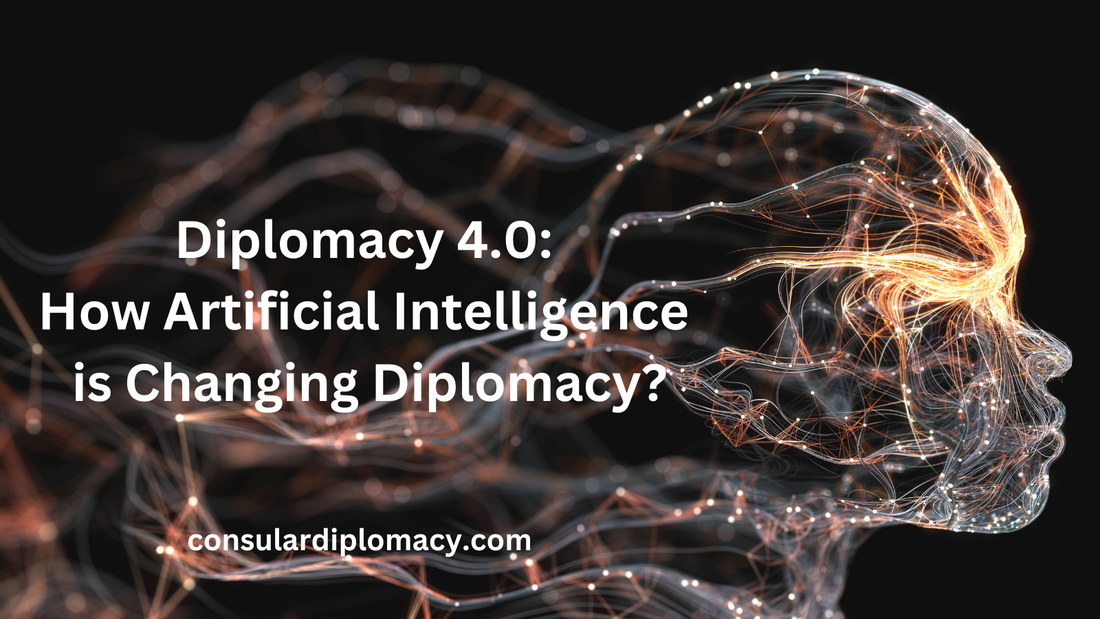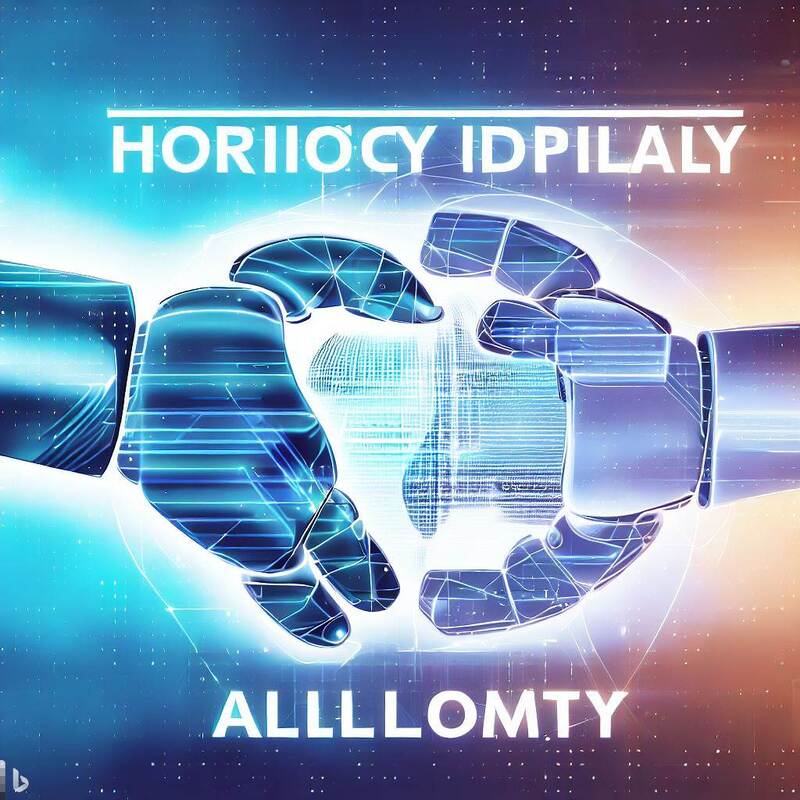ChatGPT, the next generation of conversational AI, could have a profound impact on diplomacy, disrupting how diplomats communicate, negotiate, and manage crises (Bjola & Manor, 2023). The avalanche of new Artificial Intelligence (AI) systems is non-stop. It is impossible to keep up with the AI race that began in earnest with the launch of ChatGPT in November 2022 (Manor 2023f). Today, at least four Large Language Models (LLMs) compete for the world’s attention: ChatGPT (including Bing.chat), Bard, Llama 2, and Claude. Not all are available in every country, and some are free. Many questions about Machine Learning (ML) have been raised, from the data sets used for their training, including privacy and intellectual property rights, to their biases and hallucinations. AI could prove to be a hugely disrupting force. Considering the fast pace of development, it is hard to grasp AI's impact on diplomacy. However, there is a growing number of studies about how these new systems are changing diplomacy. In this blog post, I continue with the Diplomacy 4.0 series. First, I explain why generative AI differs from previous AI systems, followed by an analysis of ML as a tool for diplomacy. In another post, I will write about AI as a topic of diplomacy and the geopolitical impact that it is having. To learn about AI basics, check out my blog post, Diplomacy 4.0: The basics of Artificial Intelligence. 1. Why all the hype about AI if it has been with us for many years? First, it is crucial to understand why the arrival of ChatGPT generated such an uproar. Manor (2023a; 2023b, 2023e) indicates that the significant factor of ChatGPT, a generative AI system, is that every single person with a computer and internet connection could use it. People do not need coding abilities or advanced mathematical training, so these systems “enable everyday users to harness the awesome power of AI” (Manor, 2023e). I am an example of this revolution, as I have used it to create a short video, suggest titles for my blog posts, such as this one, summarize articles, and experiment with a Chatbot. The new LLMs´ capability to converse with us in a human-like manner rather than with computational codes is a game-changing experience. Furthermore, the ability to continue learning and develop new skills has been breathtaking, making some AI experts nervous and leading to a request to pause its development. Besides, technological developments, from the written word to telegraphy and the internet, have always changed diplomatic practices, so the AI revolution is not different from the previous advances. However, up until now, humans were the only actors. So, with AI, a new era of interactions between humans and machines is emerging. For a historical review of the relationship between technology and diplomacy, visit the excellent site created by DiploFoundation. So, how is AI changing diplomacy? One way to study the effects of ML in diplomacy is by looking at the relationship between the two. 2. Three perspectives on the relationship between diplomacy and artificial intelligence A few years ago, the DiploFoundation proposed a framework for analyzing the relationship between diplomacy and AI programs (2019, p. 6). The study states that we need to see it from three different perspectives:
As mentioned, I focus on the first issue in this post. I will write about the other two in a separate post. 3. AI as a tool for diplomacy In recent years, a small but steady flow of studies have analyzed how AI can support the core diplomatic functions of communication, representation, and negotiation (see list of resources at the bottom of the post). The ability of ML to process enormous quantities of data in a few seconds and the multiple ways of analyzing data is crucial for diplomacy. “AI can be a useful tool in facilitating tasks that require diplomats to work with, digest, or research vast amounts of text” (DiploFoundation, 2019, p. 26). AI could “mine internal knowledge to provide insights” (Tarar 2023a) that diplomats might miss on different subjects, possibly expanding the options available to move forward. Having these types of resources would enhance the diplomat´s analysis and decision-making (Galeotti, 2023). Among the different options, Deloitte AI Institute for Government & Google Cloud have identified four different uses for AI: automate, predict, detect, and simulate (2022, p. 5-6) across three core functions: diplomacy, foreign assistance, and consular affairs, plus an additional one centered on mission-enabling functions (Ibid, p. 7-10). Even though there have been some issues with AI for hiring people, such as the one in Amazon, the U.S. Department of State is applying AI systems in the evaluation process of future diplomats. ML reviews thousands of essays submitted in the recruitment process (Keohan & Kralev, 2022). Other possible uses of ML systems for diplomacy are sentiment, predictive, and descriptive analysis (Bjola, 2019, p. 5). Manor and Tarar (2023a; 2023b) suggest that AI could save diplomats time by creating official documents and statements. AI could bridge the gap between people speaking different languages, as it can be used for interpreting in real time. It could also help translate newspapers and social media postings (Tarar, 2023b). However, relying solely upon these systems could be problematic by ignoring “cultural differences and nuances in intercultural communication” (Kurbalija, 2023). Many new ML applications are available now to help transcribe videos and audio in a fraction of the time humans; it could help in the tedious task of creating meetings´ minutes and do-outs (Tarar, 2023b). For example, the DiploFoundation used its DiploGPT system to provide a “just-in-time reporting from the six hour” UN Security Council debate titled Futureproofing trust for sustaining peace that took place on May 3, 2023 (DiploFoundation, 2023a; DiploFoundation, 2023b). Another use of AI is to train diplomats using simulations. Recently, Teleanu (2023) shared her experience using a Chabot in a simulation of a multilateral negotiation in a digital governance course. LLMs could also be helpful to do research (Tarar, 2023b) and teach and learn new abilities and skills if used correctly (Mollick, 2022; Mollick, 2023a, 2023b, 2023c). Some studies analyze or propose specific areas in which AI can enhance the work of diplomats and ministries of foreign affairs (MFAs), such as consular services, negotiations, crisis management, and public diplomacy. So, let’s review each of these four topics. 3.1 Consular Services Many studies have identified consular affairs as an area that could benefit from AI. (Bjola, 2019; Bjola, 2020; Deloitte, 2022; Manor, 2023a; Manor, 2023f, Tarar 2023a). As an area of routine operations based on processes, some consular services could automatize with AI (Bjola, 2019, p. 4; Deloitte, 2022, p. 8-9). Today, some countries are already implementing ML programs in consular services. Canada (Laferrière & McPherson, 2019), Germany, Latvia, Lithuania, the Netherlands, Hungary, and Finland are already using AI in some visa and migration procedures, including identity fraud detection, cases management, and dealing with customers (European Migration Network, 2022, p. 9-12). Besides, eleven European countries are working on several AI projects. To see all of them, see European Migration Network, 2022, p. 11-12. During the height of the COVID-19 pandemic, several MFAs utilized chatbots to provide information to their citizens stranded abroad due to the closing of borders (Birka, Kļaviņš, & Kits, 2022). 3.2 Crises management and prevention MFAs, including the UK and Germany, are already deploying “AI tools to monitor open data for early crisis detection – with the aim of expanding this towards gaining insights for crisis prevention” (DiploFoundation, 2019, p. 26). ML systems “can make sense of the nature and gravity of the events in real-time, streamline the decision-making process, manage the public’s expectations, and facilitate crisis termination” (Bjola, 2019, p. 5). 3.3 Public Diplomacy Public diplomacy is another area in which ML systems could make significant contributions. For example, “AI could assist these [public diplomacy] efforts by providing reliable diagnostics of the scope conditions for impact via network, cluster and semantic analyses” (Bjola, 2019, p. 6; Bjola, 2020, p. 29). Besides, Williams & Otto (2022) analyze the different issues related to AI that affect the public diplomacy of Iran and the United States, providing some examples. Stanzel and Voelsen (2022) have proposed using ML to perform sentiment analysis of public media regarding a trade negotiation (p. 27), which can also be used for public diplomacy. Also, ML could improve the performance of a campaign by adopting a more attractive narrative (Manor, 2023e). 3.4 Negotiations Negotiation, an essential aspect of diplomacy, can also be enhanced using AI systems (Manor, 2023a). Programs like Cognitive Trade Advisor, which “answers questions on rules of origin across a vast number of trade agreements,” can assist negotiations, especially by small countries (DiploFoundation, 2019, p. 26). In exciting research about the usage of AI in diplomatic negotiations based on two case studies, Stanzel and Voelsen (2022) conclude that AI “has the potential to become an important, possibly indispensable tool for preparing and conducting diplomatic negotiations…and those who best succeed in embracing the possibilities of machine learning will have an advantage in negotiations” (p. 30). Furthermore, they made some recommendations, including to experiment and appraise these systems, create a data strategy, “establish and institutionalize appropriate networks” (Ibid, p. 31) “and draw up normative guidelines for the use of AI in the context of diplomacy” (Ibid, p. 6). 4. Challenges of AI as a tool for diplomacy As seen here, MFAs and diplomats can benefit from using AI systems. However, to take full advantage, they need to overcome some challenges and mitigate the inherent risks. “ChatGPT, the next generation of conversational AI, could have a profound impact on diplomacy, disrupting how diplomats communicate, negotiate, and manage crises” (Bjola & Manor, 2023). One of the most significant tests is the potential for AI to generate disinformation and deep fakes on an enormous scale, which could be impossible to identify and could dampen the ability of diplomats to respond (Manor, 2023d; 2023g). According to Manor (2023g), this could lead to multiple realities. “Gaps between diplomats’ statements and ChatGPT answers may thus decrease public confidence in diplomats and diplomatic institutions” (Manor 2023e). Two examples were Pope Francis wearing a puffer white jacket that became viral or Donald Trump being arrested by the police. Generative AI already poses a challenge to managing countries' image and reputation, as shown by Manor (2023c) in the cases of Poland, Palestine, and China, where the image these governments try to portray differs from the perspective provided by chatbots. Besides, “AI-generated content could negatively impact a nation's reputation, the credibility of its leaders and undo previous diplomatic efforts” (Bjola & Manor, 2023). All these are particularly worrisome, considering that the media has pushed the narrative of AI systems as trustworthy and credible (Manor, 2023c; 2023a; 2023e). Besides, there is growing evidence that most ML programs have some biases in favor of Western perspectives vs. the rest of the world. (Manor 2023c; 2023e). Furthermore, the foundational models used for most chatbots have centered on English language sources, affecting the views and perspectives of other languages, including their computational costs. Manor (2023a) details that one of the main challenges of AI systems such as ChatGPT is continuing to expand the gap between reality and the views generated by digital technologies that support the growing attraction of populist leaders. These leaders can undermine governments’ institutions, including diplomats, and affect their efforts to find global solutions to global problems. This view contradicts Simon Anholt´s proposal in the Good Country Index, in which governments should have a dual mandate: support their citizens while backing the world at large. Another challenge is the effect of LLMs on the agency of diplomats. Bjola and Manor (2023) explain that “while automation may be cost-effective, it may not necessarily translate into effectiveness in diplomacy, which relies heavily on informal conversations and personal relationships between diplomats.” AI training for diplomats and other actors involved in foreign policy is essential to fully take advantage of ML benefits. Experimenting with LLMs will help diplomats identify these technologies' potential pitfalls (Manor, 2023g). However, “placing more diplomats in front of computer screens and training them to converse with AIs rather than humans may result in diplomats who are ill-equipped to manage diplomatic relations with other states” (Bjola & Manor, 2023). Placing more diplomats in front of computer screens and training them to converse with AIs rather than humans may result in diplomats who are ill-equipped to manage diplomatic relations with other states (Bjola & Manor, 2023). It is also crucial that diplomats understand that anything they feed into the AI systems could be used for training; therefore, it is imperative to avoid providing sensitive and confidential information (Tarar, 2023b). I wonder if it could be possible that by good prompting and some hacks, people can pinpoint some data provided to the LLM with confidential information.
One way to meet these challenges is to regulate AI (Manor 2023a), an issue that will be covered in the next post. 5. Preliminary conclusions Generative AI has arrived, and it is not going anywhere. The genie is out of the bottle. Therefore, governments, diplomats, and people cannot relax and wait and see what happens next. They must develop a comprehensive approach that includes training for everybody, some sort of regulations, and trends analysis. A meaningful action that MFAs can implement now is engaging in technology diplomacy or Techplomacy, which entails dialogue and building relationships with the tech ecosystem, including direct contact with the Tech giants, most of which are at the forefront of the AI race. Countries like Australia, France, the Netherlands, Switzerland, and the United Kingdom have gone further and have designed digital foreign policy strategies, which I believe is a must in today´s world, more and more embedded in the cyber realm. See also Tech diplomacy practice in the San Francisco Bay Area. In the next blog post, I will focus on AI as a topic for Diplomacy and the impact that LLMs are having on the geopolitics of today´s global disorder, as ML is becoming a source of power. You can also read my blog posts about the subject here:
Resources on AI and Diplomacy Here is a list of resources on AI and diplomacy. Please share new ones! AI tools and application/experiments/usage Diplo AI Writer @ DiploFoundation is a DiploFoundation artificial intelligence writer who publishes blog posts about the subject. HumAInism by DiploFoundation has some AI tools related to diplomacy and arts. Can ChatGPT Explain Geopolitics? is an exercise to compare two essays and test if you can identify the one written by AI. It is published by Foreign Policy magazine. Interactive webpage about the cost of AI in different languages (Tokenization fairness). Webpages Artificial Intelligence and Diplomacy by DiploFoundation. Artificial Intelligence by Digwatch (Geneva Internet Platform) Center for AI and Digital Policy Center for the Advancement of Trustworthy AI Partnership on AI Videos Artificial Intelligence and Diplomacy Webinar. UNITAR and UOC. (2023, February 15). AI and Diplomacy: Challenges and opportunities. UNITAR (2023, May 10) Studies and articles Bjola, C. (2019, October 19). Diplomacy in the Age of Artificial Intelligence. Real Institute Elcano. Bjola, C. (2020). Diplomacy in the Age of Artificial Intelligence. EDA Working Paper. Emirates Diplomatic Academy. Bjola, C. & Manor, I. (2023, April 25). ChatGPT: The end of diplomacy as we know it. Global Policy. Cocking, S. (2016, September 19). Using algorithms to achieve digital diplomacy. A conversation with Elad Ratson, Director of R&D at Ministry of Foreign Affairs. Irish Tech News. Deloitte AI Institute for Government & Google Cloud. (2022). Using Artificial Intelligence (AI) to Modernize American Statecraft. Dickow, M. and Jacob, D. (2018). The Global Debate on the Future of Artificial Intelligence. Stiftung Wissenschaft und Politik [SWV] Comment No. 23, p. 7. Digwatch. (2019, February 5). Artificial intelligence and diplomacy: A new tool for diplomacy? EVENT REPORT. Digwatch. Geneva Internet Platform. Digwatch. (2023, July 17). UN Security Council convenes to discuss AI risks. Digwatch. Geneva Internet Platform DiploFoundation. (2019). Mapping the challenges and opportunities of artificial intelligence for the conduct of diplomacy. DiploFoundation and the Ministry of Foreign Affairs of Finland. DiploFoundation. (2023, May 3). First full AI-reporting from the UN meeting. DiploFoundation blog. DiploFoundation. (2023, May 3). AI-based report of United Nations Security Council debate marks start of a new era in multilateral diplomacy. DiploFoundation blog. Elia Valori, G. (2023, July 8). Artificial Intelligence and the New World Order (1). Modern Diplomacy. Elia Valori, G. (2023, July 30). AI and the new world order: Economy and war (2). Modern Diplomacy. European Migration Network. (2022). The use of digitalisation and artificial intelligence in migration management: Joint EMN-OECD Inform. Galeotti, M. (2023, January 7). The age of AI diplomacy. The Spectator. Keohan, C. & Kralev, N. (2022, August 7). Want to Be a Diplomat? You Must Make it Past and A.I.’ Gateway’. Diplomatic Diary blog. Washington International Diplomatic Academy. Kurbalija, J. (2023, May 1). Why might AI cause more ´lost in translation´ worldwide? DiploFoundation Blog. Kurbajila, J. (2023, June 12). The case for bottom-up AI. Al Jazeera. Kurbalija, J. (2023, August 1). What can Socrates teach us about AI and prompting? DiploFoundation Blog. Laferrière, H. & McPherson, A. (2019, April 24). Augmented Decision-Making @ IRCC. Presentation to the Symposium on Algorithmic Government. Immigration, Refugees and Citizenship Canada. Lederer, E. (2023, July 3). UN Council to hold first meeting on potential threats of artificial intelligence to global peace. AP News. Manor, I. (2023, February 21). The AI Moves In: ChatGPT’s Impact on Digital Diplomacy. Exploring Digital Diplomacy Blog. Manor, I. (2023, March 30). ChatGPT and the Future of Diplomacy. Exploring Digital Diplomacy Blog. Manor, I. (2023, April 4). ChatGPT and the Future of Diplomacy - Part 2. Exploring Digital Diplomacy Blog. Manor, I. (2023, April 18). ChatGPT and the Future of Diplomacy - Part 3. Exploring Digital Diplomacy Blog. Manor, I. (2023, June 15). AI’s Impact on Public Diplomacy. Exploring Digital Diplomacy Blog. Manor, I. (2023, June 27). The Many Races that will shape AI. Exploring Digital Diplomacy Blog. Manor, I. (2023, July 4). Real Fakes and the Future of Diplomacy. Exploring Digital Diplomacy Blog. Manor, I. (2023, August 15). Towards the Strategic Use of AI in Diplomacy. Exploring Digital Diplomacy blog. O´Neil, L (2023, August 12). The Truth in Tech: These Women Tried to Warn Us about AI. Rolling Stone. Petrov, A., La Malfa, E., Torr, P. H.S., & Bibi, A. (2023, May 17). Language Model Tokenizers Introduce Unfairness Between Languages. ArXiv:2350.1542. Scott, B., Heumann, S., & Lorenz, P. (2018). Artificial Intelligence and Foreign Policy. Stiftung Neue Veranwortung. Stanzel, V. & Voelsen, D. (2022). Diplomacy and Artificial Intelligence Reflections on Practical Assistance for Diplomatic Negotiations. SWP Research Paper. Strachan, G. & Manor, I. (2023, July 14). ‘I can be a bastard too’- ChatGPT’s Real Contribution to Diplomacy. Exploring Digital Diplomacy Blog. Tarar, Z. (2023, February 23). Analysis - Could AI change the business of diplomacy? The Diplomatic Pouch at Medium. Tarar, Z. (2023, February 27). Analysis - Which AI tools should diplomats use today? The Diplomatic Pouch at Medium. Tarar, Z. (2023, August 28). Analysis - Harnessing AI for diplomacy: Five tools to make your work easier. The Diplomatic Pouch at Medium Teleanu, S (2023, August 21). A journey of discovery: Using simulation and AI to teach and learn about digital governance. DiploFoundation Blog. Williams, A., Micali, M. & Gebru, T. (2022, October 23). The Exploited Labor Behind Artificial Intelligence. NOEMA. Williams, R. & Otto, L. (2022). Artificial Intelligence as a Tool of Public Diplomacy: Communication between the United States and Iran. The Thinker 90(1) p. 28-40. Information about using AI for teaching and learning Mollick, E. (2022, December 13). How to…use AI to teach some of the hardest skills. One Useful Thing blog. Mollick, E. (2023, January 24). The practical guide to using AI to do stuff. One Useful Thing blog. Mollick, E. (2023, March 17). Using AI to make teaching easier & more impactful. One Useful Thing blog. Mollick, E. (2023, July 15). How to Use AI to Do Stuff: An Opinionated Guide. One Useful Thing blog. Mollick, E. Video series on Practical AI for Teachers and Students. YouTube. References Birka, I., Kļaviņš, D., & Kits, R. (2022). Duty of Care: Consular Diplomacy Response of Baltic and Nordic Countries to COVID-19. The Hague Journal of Diplomacy, 18(1), p. 133-164. https://doi.org/10.1163/1871191x-bja10115 Bjola, C. (2019, October 19). Diplomacy in the Age of Artificial Intelligence. Real Institute Elcano. Bjola, C. (2020). Diplomacy in the Age of Artificial Intelligence. EDA Working Paper. Emirates Diplomatic Academy. Bjola, C. & Manor, I. (2023, April 25). ChatGPT: The end of diplomacy as we know it. Global Policy. Deloitte AI Institute for Government & Google Cloud. (2022). Using Artificial Intelligence (AI) to Modernize American Statecraft. DiploFoundation. (2019). Mapping the challenges and opportunities of artificial intelligence for the conduct of diplomacy. DiploFoundation and the Ministry of Foreign Affairs of Finland. DiploFoundation. (2023a, May 3). First full AI-reporting from the UN meeting. DiploFoundation blog. DiploFoundation. (2023b, May 3). AI-based report of United Nations Security Council debate marks start of a new era in multilateral diplomacy. DiploFoundation blog. European Migration Network. (2022). The use of digitalisation and artificial intelligence in migration management: Joint EMN-OECD Inform. Galeotti, M. (2023, January 7). The age of AI diplomacy. The Spectator. Keohan, C. & Kralev, N (2022, August 7). Want to Be a Diplomat? You Must Make it Past and A.I.’ Gateway’. Diplomatic Diary blog. Washington International Diplomatic Academy. Kurbalija, J. (2023, May 1). Why might AI cause more ´lost in translation´ worldwide? DiploFoundation Blog. Laferrière, H. & McPherson, A. (2019, April 24). Augmented Decision-Making @ IRCC. Presentation to the Symposium on Algorithmic Government. Immigration, Refugees and Citizenship Canada. Manor, I. (2023a, February 21). The AI Moves In: ChatGPT’s Impact on Digital Diplomacy. Exploring Digital Diplomacy Blog. Manor, I. (2023b, March 30). ChatGPT and the Future of Diplomacy. Exploring Digital Diplomacy Blog. Manor, I. (2023c, April 4). ChatGPT and the Future of Diplomacy - Part 2. Exploring Digital Diplomacy Blog. Manor, I. (2023d, April 18). ChatGPT and the Future of Diplomacy - Part 3. Exploring Digital Diplomacy Blog. Manor, I. (2023e, June 15). AI’s Impact on Public Diplomacy. Exploring Digital Diplomacy Blog. Manor, I. (2023f, June 27). The Many Races that will shape AI. Exploring Digital Diplomacy Blog. Manor, I. (2023g, July 4). Real Fakes and the Future of Diplomacy. Exploring Digital Diplomacy Blog. Mollick, E. (2022, December 13). How to…use AI to teach some of the hardest skills. One Useful Thing blog. Mollick, E. (2023a, January 24). The practical guide to using AI to do stuff. One Useful Thing blog. Mollick, E. (2023b, March 17). Using AI to make teaching easier & more impactful. One Useful Thing blog. Mollick, E. (2023c, July 15). How to Use AI to Do Stuff: An Opinionated Guide. One Useful Thing blog. Stanzel, V. & Voelsen, D. (2022). Diplomacy and Artificial Intelligence Reflections on Practical Assistance for Diplomatic Negotiations. SWP Research Paper. Tarar, Z. (2023a, February 27). Analysis - Which AI tools should diplomats use today? The Diplomatic Pouch at Medium. Tarar, Z. (2023b, August 28). Analysis - Harnessing AI for diplomacy: Five tools to make your work easier. The Diplomatic Pouch at Medium. Teleanu, S (2023, August 21). A journey of discovery: Using simulation and AI to teach and learn about digital governance. DiploFoundation Blog. Williams, R. & Otto, L. (2022). Artificial Intelligence as a Tool of Public Diplomacy: Communication between the United States and Iran. The Thinker 90(1) p. 28-40. DISCLAIMER: All views expressed on this blog are those of the author and do not represent the opinions of any other authority, agency, organization, employer or company. Below are some images created by Bing.chat. Interestingly, I explicitly asked not to include robots, but the system did not seem to care. What are your thoughts?
0 Comments
|
Rodrigo Márquez LartigueDiplomat interested in the development of Consular and Public Diplomacies. Archives
May 2024
Categories
All
|




